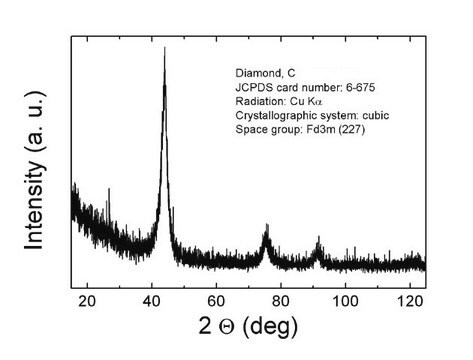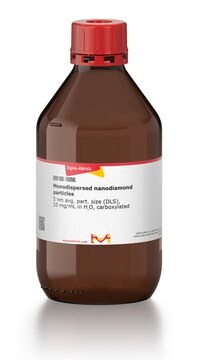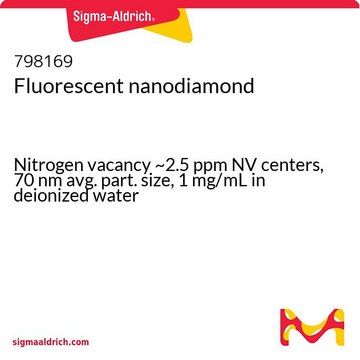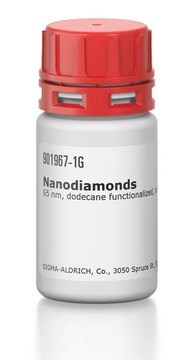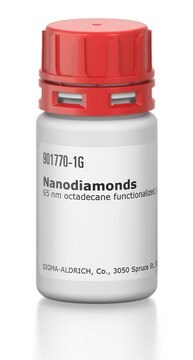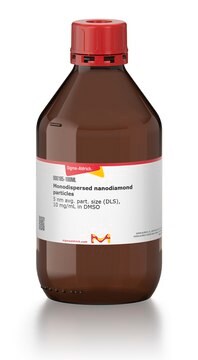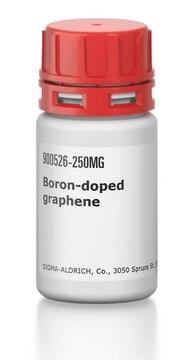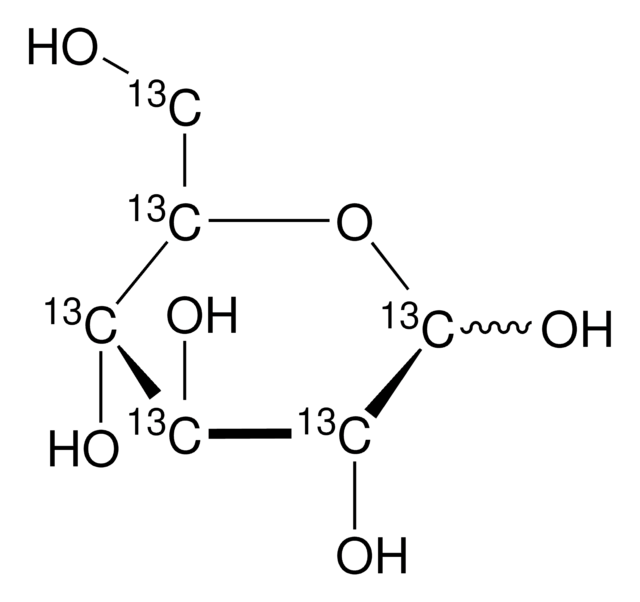636428
Diamond
nanopowder, <10 nm particle size (TEM), ≥97% trace metals basis
Synonyme(s) :
Diamond dust
Se connecterpour consulter vos tarifs contractuels et ceux de votre entreprise/organisme
About This Item
Formule empirique (notation de Hill):
C
Numéro CAS:
Poids moléculaire :
12.01
Numéro CE :
Numéro MDL:
Code UNSPSC :
12352302
Nomenclature NACRES :
NA.23
Produits recommandés
Niveau de qualité
Pureté
≥97% trace metals basis
Forme
nanopowder
spherical
Superficie
200-450 m2/g , BET
Taille des particules
<10 nm (TEM)
Densité
3.5 g/mL at 25 °C (lit.)
Masse volumique apparente
0.2‑0.7 g/mL
Vous recherchez des produits similaires ? Visite Guide de comparaison des produits
Catégories apparentées
Description générale
The particle size of diamond nanopowder is less than 50 nm and surface area is an average of 100 m2/g. Diamond nanopowder may be produced by multicathode direct current plasma chemical vapor deposition and high pressure high temperature (HPHT). Potential uses of nano-diamond are in biosensor applications. Surface modification of nano-diamond may enhance its linking mechanism with specific biomolecules.
Application
- Insight into Interfacial Heat Transfer of β-Ga(2)O(3)/Diamond Heterostructures via the Machine Learning Potential.: This study explores the interfacial heat transfer in β-Ga2O3/diamond heterostructures, providing critical insights for thermal management in high-power electronics, a key component in the development of efficient energy storage and conversion systems (Sun et al., 2024).
- Impurity characterization in diamond for quantum and electronic applications: advances with time-resolved cathodoluminescence.: The study details advancements in characterizing impurities in diamond, crucial for the development of quantum computing devices and other high-precision electronic applications, using innovative time-resolved cathodoluminescence techniques (Arnold et al., 2024).
- Thermal Conductivity and Sintering Mechanism of Aluminum/Diamond Composites Prepared by DC-Assisted Fast Hot-Pressing Sintering.: Focused on enhancing the thermal management capabilities of materials, this research investigates the thermal properties of aluminum/diamond composites, vital for developing more efficient cooling systems in electronic and energy storage devices (Jia et al., 2024).
Code de la classe de stockage
11 - Combustible Solids
Classe de danger pour l'eau (WGK)
nwg
Point d'éclair (°F)
Not applicable
Point d'éclair (°C)
Not applicable
Équipement de protection individuelle
Eyeshields, Gloves, type N95 (US)
Faites votre choix parmi les versions les plus récentes :
Déjà en possession de ce produit ?
Retrouvez la documentation relative aux produits que vous avez récemment achetés dans la Bibliothèque de documents.
Les clients ont également consulté
Thermo-oxidation of tokamak carbon dust.
Davis JW, et al.
Journal of Nuclear Materials, 386, 764-767 (2009)
Reactions of amines with CVD diamond nanopowders.
Lee J K, et al.
Diamond and Related Materials, 14(3-7), 675-678 (2005)
Functionalized diamond nanopowder for phosphopeptides enrichment from complex biological fluids.
Hussain D, et al.
Analytica Chimica Acta, 775, 75-84 (2013)
Pontus Forsberg et al.
Optics express, 21(3), 2693-2700 (2013-03-14)
Control of the sidewall angle of diamond microstructures was achieved by varying the gas mixture, bias power and mask shape during inductively coupled plasma etching. Different etch mechanisms were responsible for the angle of the lower and upper part of
P Pereira Nogueira et al.
The Journal of clinical pediatric dentistry, 37(1), 53-57 (2013-01-25)
The aim of the present study was to evaluate hybrid layer thickness of primary molars sectioned with diamond, carbide and ultrasonic CVD burs. The occlusal enamel surfaces often molars were removed and superficial dentin was exposed. Three standardized cavities were
Notre équipe de scientifiques dispose d'une expérience dans tous les secteurs de la recherche, notamment en sciences de la vie, science des matériaux, synthèse chimique, chromatographie, analyse et dans de nombreux autres domaines..
Contacter notre Service technique